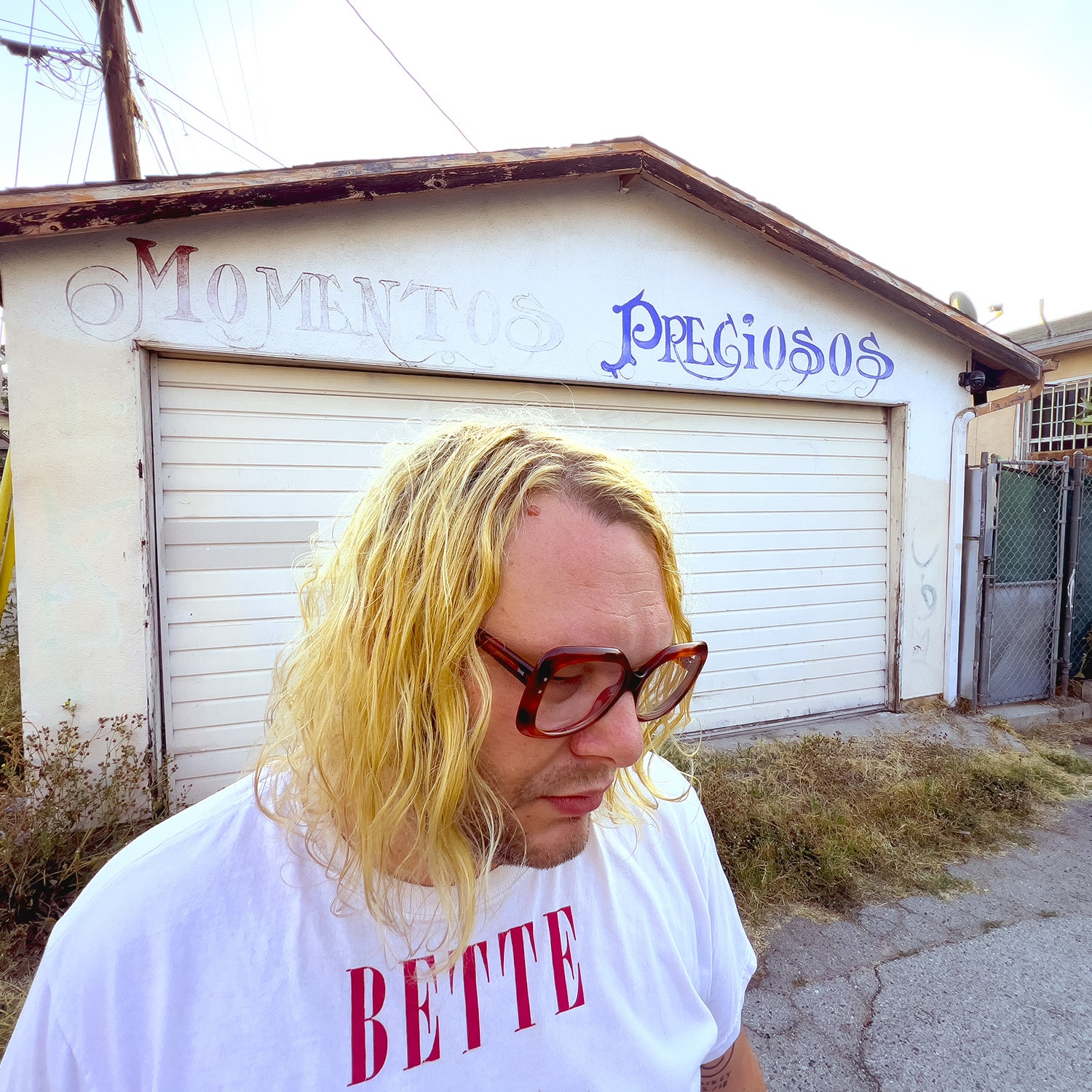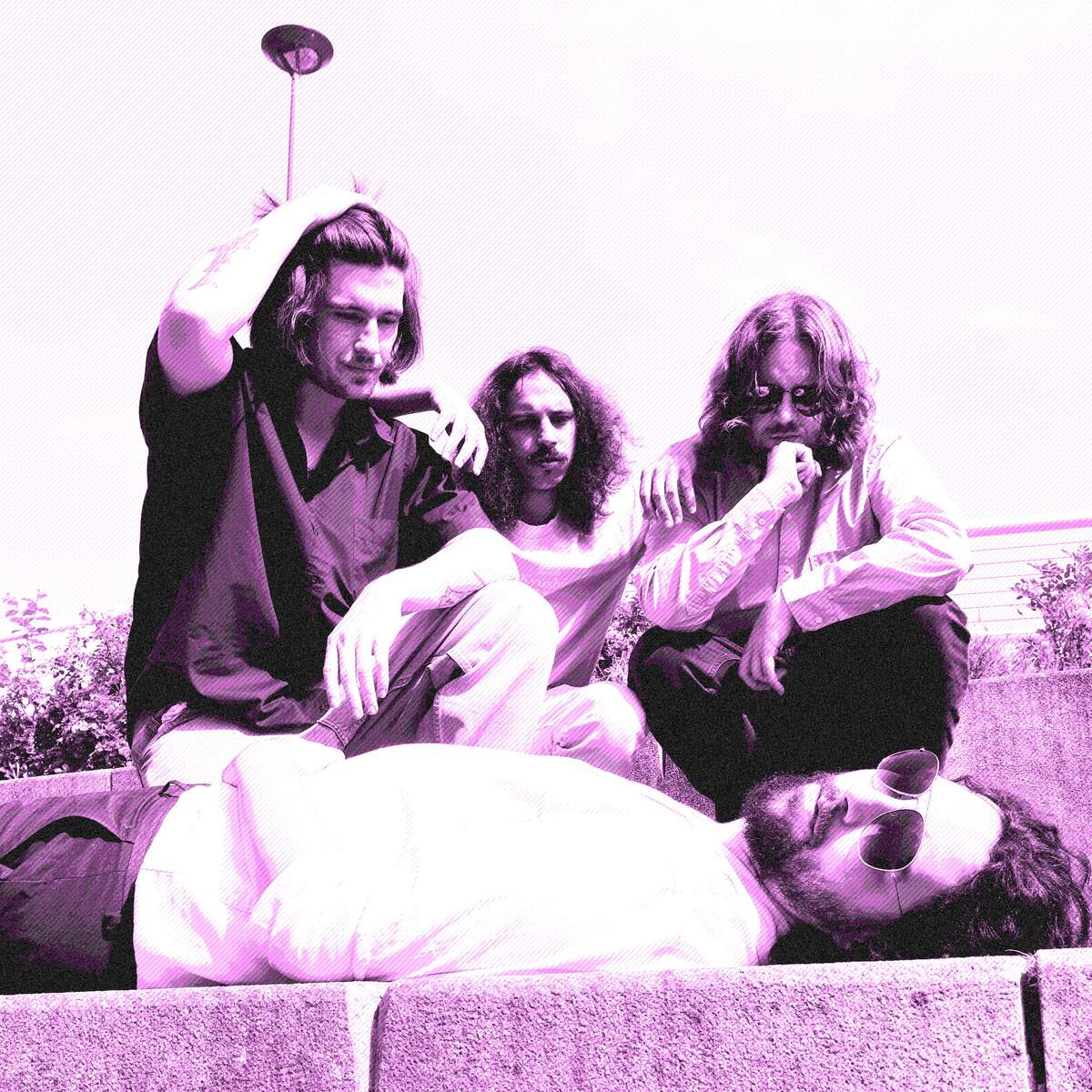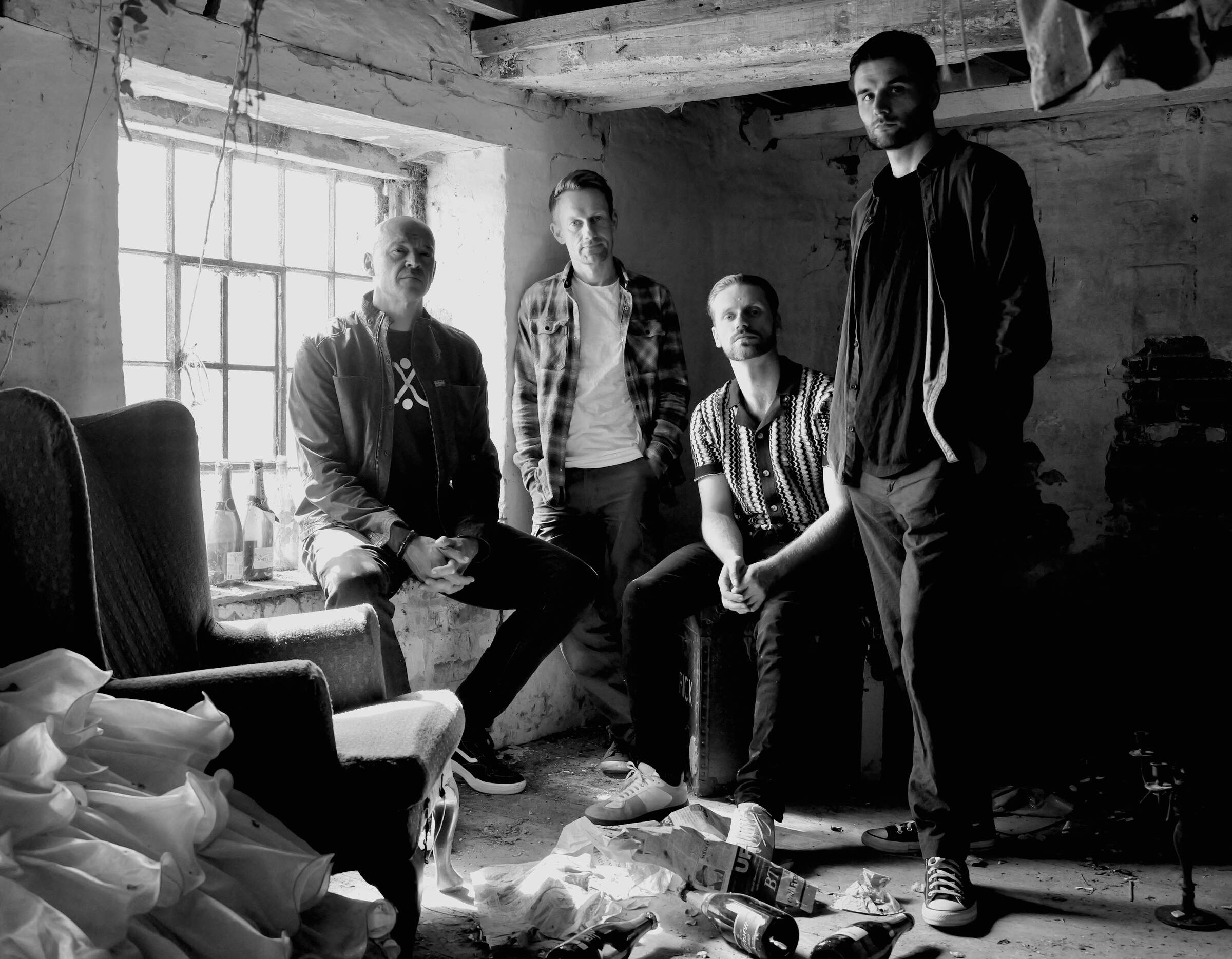Psychedelic sound & Underground movement in Czechoslovakia in 1960s & 1970s
Psychedelic sound & Underground movement in Czechoslovakia in 1960s & 1970s
Hells Devils
Rock’n’roll group Hells Devils are regarded as the first underground band in Czechoslovakia. The band was founded in 1961 and existed until their prohibition by communists in 1964. However, their repertoire consisted of cover versions of songs by Cliff Richard, Elvis Presley and The Shadows, the band was, in our country, very progressive because of the stage presentation – The Hells Devils performed in special costumes (black trousers, red shirts), experimenting with stage lighting – by the sides of the stage was red-flashing panels with name of the band. The band was progressive mainly because of their managers – Eugen Fiala and his father Eugen, called “Toscani”.
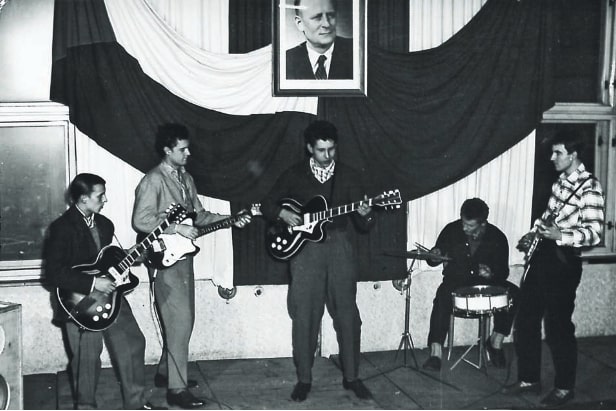
The beginnings of Hells Devils go back to year 1961 when two friends, guitarists Zdeněk “Kelly” Macháček and Jiří “Satan” Sigmund decided to found a rock’n’roll band. After a while guitarist Mirek Kyncl and drummer Emil Gröschell joined the band. The last member of Hells Devils was singer Miloš Vokurka. In a short time the drummer position was replaced by Miroslav Schwartz, later known as “Tony Black”. Very important band member was sound technician, inventor and rock’n’roll fan Zbyněk Lán “Binny Laney”. Binny was known, in Prague rock’n’roll community as electrotechnical genius who constructed DIY amplifiers, tape recorders. He was recording music programs from A.F.N Munich radio station, which was broadcasting for US Army in West Germany, and later from Radio Luxembourg. Binny was often persecuted by Communist police for broadcasting music programs of prohibited Radio Free Europe to Czechoslovakian radio ether. In 1962 Binny Laney became a sound engineer of Hells Devils, and in that same year Evžen Fiala with his father, Eugen “Toscani” Fiala, joined the band as their new managers and producers. Father & son Fiala took care of band’s scenic presentation – shiny red shirts and black trousers became characteristic clothing of musicians, the scenery was consisting of red light spotlights, panels with red-flashing name of the band and some smoke pyrotechnical effects. The main aim was to break border between musician and auditorium and to induce the right “devil atmosphere”.
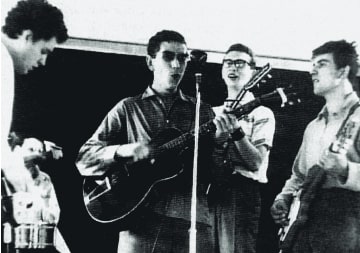
The repertoire of Hells Devils consisted of wild cover version of rock’n’roll songs by Little Richard, Elvis Presley, Eddie Cochran or Cliff Richard and surf-instrumentals by The Shadows or The Ventures. Hells Devils become, in short time truly cult band, especially in community of first Prague “long hairs” – young people who didn’t want to live life under communist totalitarian policy. The most famous era, for the band, was in the end of 1963 till the spring of 1964. The band often changed its personnel – the members were guitarist Karel Kahovec (later in Flamengo) or bass-guitarist Zdeněk Rytíř (later in Mefisto, and in 1970s he was lyric writer for Olympic), as well. In 1964 began hard times for band – their concerts were too provocative for communists, because their concerts, and rock’n’roll music, as well, were expression of freedom and unchained (“American”) way of life which communists strongly hated. Evžen Fiala was arrested in May 1964 in case of sponging; the official press was publishing dishonouring articles which described Hells Devil as hooligans, vandals and enemies of socialist establishment. Their concerts were interrupted by communist cops. The band’s last concert was performed on April, 3, 1965 in Czech town Brandýs nad Labem and it was pure underground happening. The performance was stopped by police and Hells Devil became an officially prohibited band.
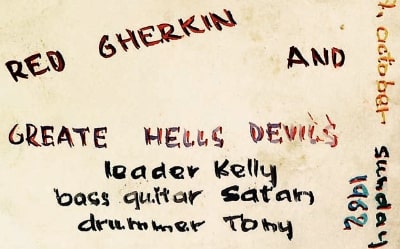
Aktual
Aktual was founded as artistic group by Milan Knížák in 1963, in Prague. The young artistic collective around Milan Knížák was focused on conceptual art. The theoretical base of the group was self-titled non periodical Samizdat magazine. Milan Knížák with Aktual organised street events and happenings. In 1966 was established Aktual club, and the artistic group became a movement. The members were: Milan Knížák, Jan Maria Mach, Vít Mach, Soňa Švecová and Jan Trtílek.
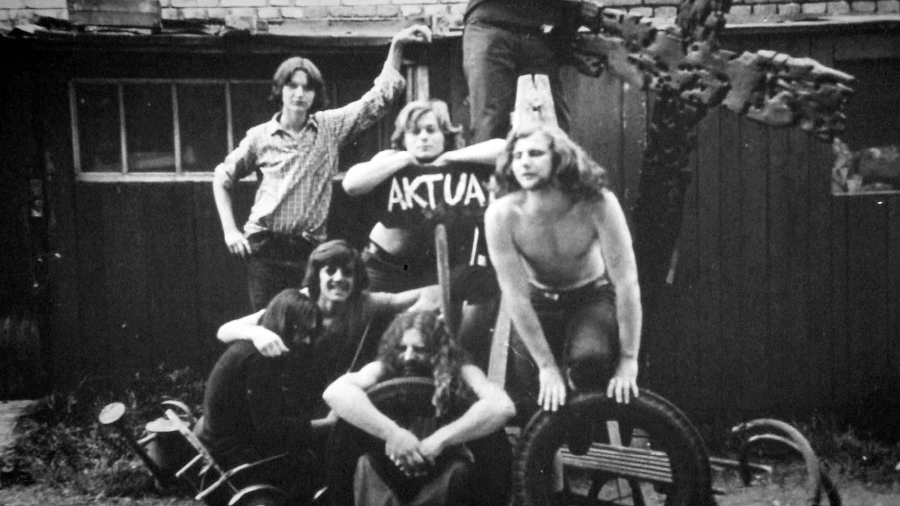
Their artistic group soon started a music group with the same name. Milan Knížák was expelled from Prague to Mariánské Lázně by communist cops, because of his anti-establishment activities. Knížák was interested in contemporary music presented by John Cage or Karlheinz Stockhausen and influence of this music was reflected in his work with Aktual. The band’s personnel consisted of combination of musicians and non-musicians. Their music was based on experimentation; the songs had primitive melodic and harmonical structure and the lyrics was full of absurd visions or provocative slogans. Instrumentation was combined of classic rock-music instruments and various objects that can produce some sounds – barrels, drill machine, motorcycle, cutting the wood. Aktual’s best-known songs were “Žlutý marťan” (Yellow Martian), “Miluje tebe a Lenina” (I love you and Lenin), “Atentát na kulturu” (The Assassination of Culture),“Život je boj” (The Life is the Fight) or “Jak by to bylo krásný” (How it would be wonderful) and“Drop Acid you’ll See” – both inspired by Milan Knížák’s LSD trip.
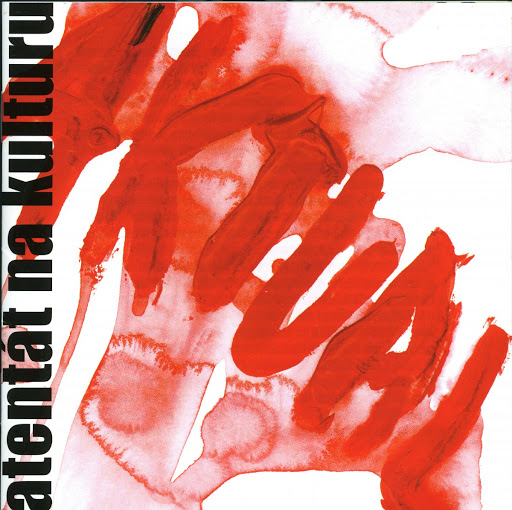
In 1969 Milan Knižák had visited USA and became a member of artistic movement Fluxus. Aktual was very influential group for other underground bands – The Plastic People, DG 307 and Umělé hmota and for all counter-culture youth in Czechoslovakia.
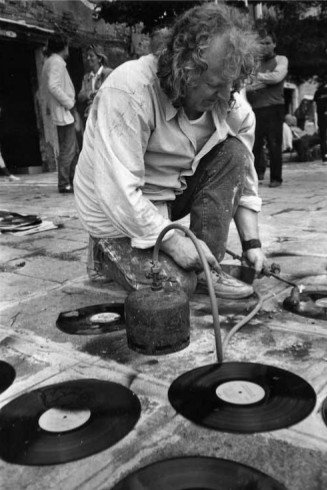
The Primitives Group
The Primitives Group was formed as a fusion of members of two bands Primitiv and P-67 in 1966 in Prague. Former members were Ivan Hajniš – vocals, harmonica, Zdeněk Burda – guitar, Pavel Pešta – bass guitar, Jaroslav “Erno” Šedivý – drums and their manager Eugen Fiala with his father, who was the band’s producer. From the beginning, the band was strongly oriented on rhythm & blues, garage and psychedelic music. Their first repertoire consisted of covers of The Who, Count Five, Small Faces or The Pretty Things, Dutch bands such as The Zipps, The Outsiders or Q65.
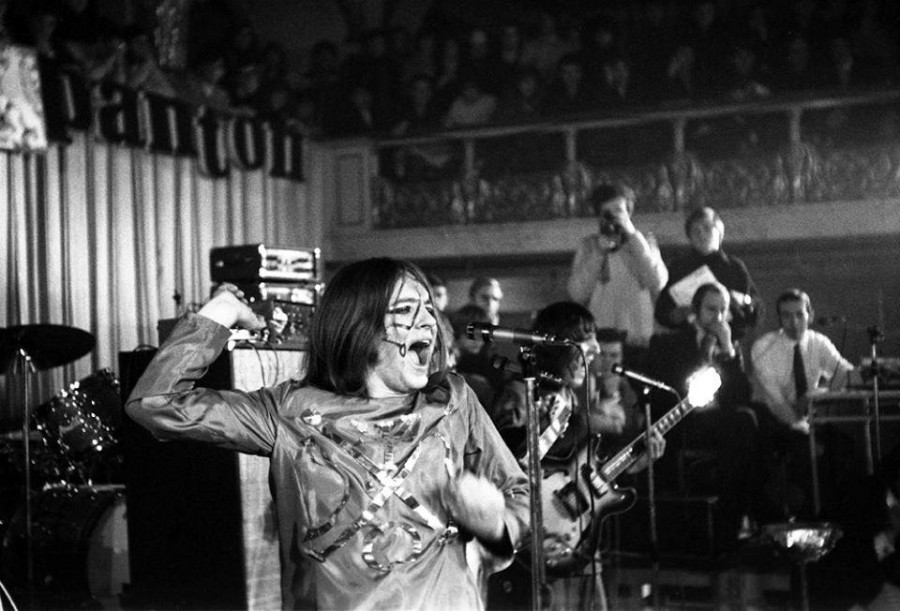
However, the band played only cover versions their entire career; it was very important group in Czechoslovakia because of their spectacular theatrical performances, presented maybe a few months before events in San Francisco or London. The band used, as the first band in Czechoslovakia, light shows, pyrotechnical effects with burning fires and coloured smoke shells. The musicians wore psychedelic costumes and their faces were masked by various make-up. The Primitives Group, from the start of their career presented a resistance against communist totalitarian politics for Czechoslovakian long-haired youth.
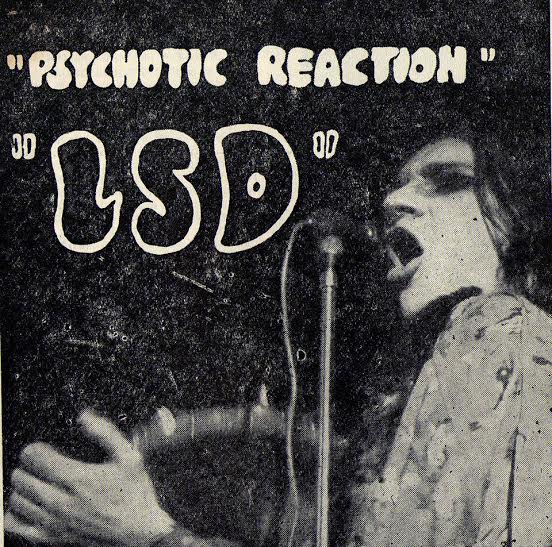
In 1967 joined the band team of artists – Ivan Martin Jirous and Věra Jirousová (art historian), Jan Ságl (photographer), his wife Zorka Ságlová (conceptual artist and author of happenings) and Dušan Kadlec (painter). In collaboration with team of artists, the band began to produce much more artistic performances, influenced by psychedelic movement (which was very intuitive – information about youth cultural movement of London, New York or San Francisco was, in Czechoslovakia, thanks to censorship and information barrier, very poor), Jewish Kabbalah, Celtic mythology and astrology, as well.
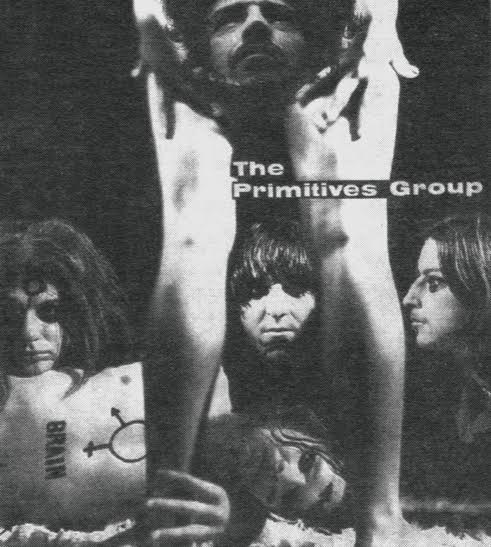
Jaroslav “Erno” Šedivý left the band and was replaced by drummer Anatolij Kohout. The repertoire of the band began to be more oriented to psychedelia – the band played songs by Blues Magoos, The Fugs, The Mothers of Invention, Grateful Dead and especially The Doors. This music was known only to a few music fans in Prague and was totally unknown for majority of Czechoslovakian youth.
The Primitives Group were very popular for their independent conception of events which were combinations of music, art happenings, light and fire shows and their concerts were sold out by a few hours from propagation of events. Many of their events were interrupted and prohibited by communist cops.
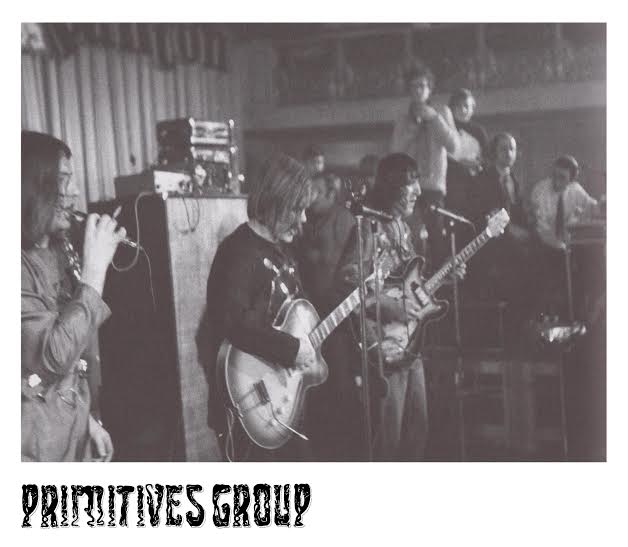
Several their conceptual concerts (or rather happenings) are very legendary nowadays:
“Make Love Not War” (1967) – In November 1967 the band performed in Music F Club in Prague. The inspiration of hippie culture reflected on whole conception of this performance – the interior of club was decorated with flowers, musicians were lighted by colourful luminescent lights and red light-bulbs were flashing on the stage. The diapositives with scenes from horror films were screened on the stage’s back wall during the concert.
“The Golden Masks and the First Bengali Fires” (1967) – The Primitives Group played the concert at the 1st Czechoslovakian Beat Festival in Prague, in December 1967. The main parts of stage scene were gold-coloured plaster mortuary masks of musicians’ faces which were made by artist Dušan Kadlec. These golden heads stood on long rods at the edge of the stage and during the performance were set by the fire. The faces of musicians were made-up of golden colour, as well. The back side of the scene, behind the musicians was created of large painting of landscape with golden, violet and black flowers according to Japanese artwork. The author of the back-side scene was Zorka Ságlová. From the mezzanines, down to auditorium were falling colourful balloons and light effects were used, as well.
“Cosmogony” (1968) – For The 2nd Czechoslovakian Beat Festival the Primitives Group’s team had prepared performance dedicated to cosmogony, mystics, Kabbalah and Heinrich Cornelius Agrippa von Nettesheim, the German philosopher and occultist. The musicians performed in special costumes with symbols of planets according to Agrippa on their chests – Ivan Hajniš had the symbol of Venus, lead guitarist Josef Janíček – Mars, guitarist M. Martiník – Saturn, bass guitarist Ivan Pešl – The Sun, organist Ctibor Kadlec – The Moon and drummer Ludwig Šíma – Jupiter. The Agrippa’s Kabbalistic symbols were drawn also on faces of musicians. The stage was edged by bowls with fires and during the production the colourful smoke shells were used and artificial snow had fallen from the galleries.
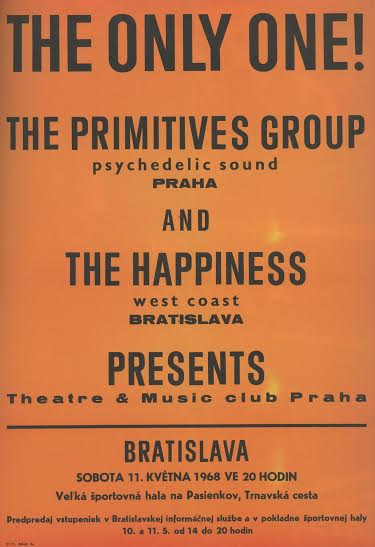
“Fish Feast” (1968) – At the home scene of The Primitives Group, in Music F Club was performed the first of four planned music happenings which were dedicated to elements and mythology. The “Fish Feast” was performed in February 1968 and the happening was dedicated to water, fish and water animals and water astrological signs. The scene was created of glittering reflecting materials evoking the water surface, in the stage’s back side was, for the whole production, screened the sea surf and in the aquarium swam real fish. The costumes were sewed of green and blue luminescent textile combined with silver and translucent foil. Also, the Kabbalistic symbolism was used again. Over the spectators’ head was hanging fishing net and the auditorium was sprinkled by water aerosol.
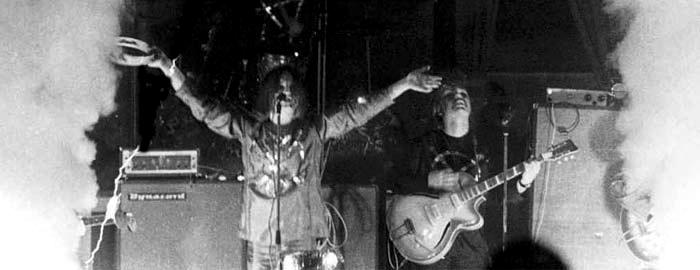
“Bird Feast” (1969) – In January 1969 at Music F Club the band performed their second music happening dedicated to elements. “Bird Feast” was conceived as a celebration of birds, wind and air. The author of the scene concept was Jan Ságl. The scene was created as an environment of 100 kg of white feathers. The walls and the floor of club were covered by these feathers. During the concerts, the spectators were tossing up the feathers, so the whole space of club was full of it. On the stage back side wall were projected monochromatic diapositives of birds, films with balloons, air planes and water birds and diapositives of collages with bird motives by Prague artist and poet Jiří Kolář. Between the songs were played recordings of bird’s sounds recorded during the dawn at Prague ZOO. The large cigar-shaped balloons were floating over the auditorium.
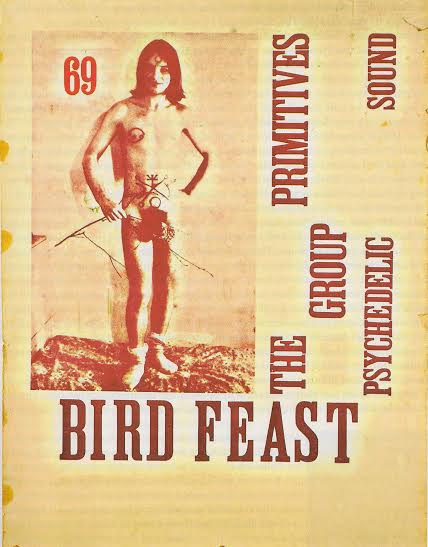
In the end of 1969, the most of the members of The Primitives Group emigrated to Western Europe and the band have split up. Josef Janíček moved to The Plastic People of the Universe.
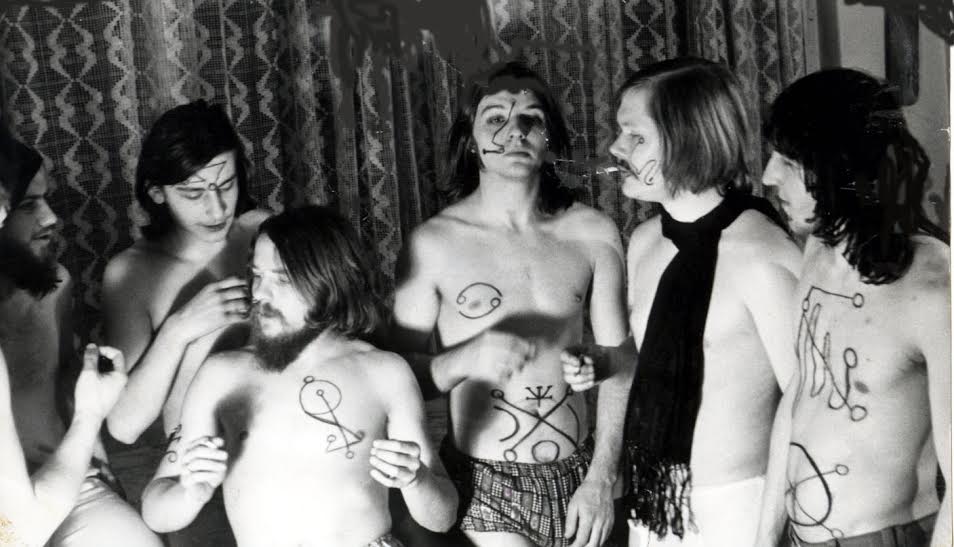
The Plastic People of the Universe
The Plastic People of the Universe were founded in September 1968. The former members were Milan “Mejla” Hlavsa – bass guitar, vocals, Michal Jernek – vocals, clarinet, soprano saxophone, Jiří “Přemysl” Števich – guitar and Josef Brabec – drums. Josef Brabec was, in short time replaced by Pavel “Eman” Zeman. The band was strongly influenced by music of The Velvet Underground, The Mothers of Invention and by scenic presentation of The Primitives Group, as well.
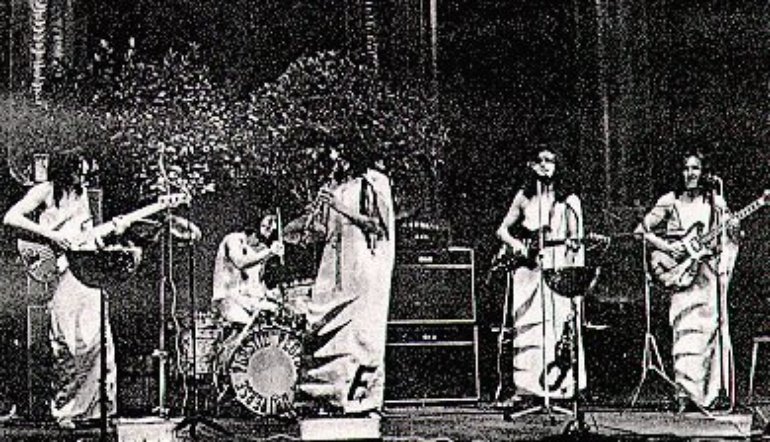
Under the influence of The Primitives Group they began to conceive their performances as music happenings. The Plastics, same as The Primitives Group used fires, costumes and theatrical make-up in their performances. From the beginnings, the band played their own songs such as “Muž bez uší” (The Man without Ears), “Modrý autobus” (The Blue Bus) or “Poschodí omamných jedů” (The Floor of Dazing Poisons). Except of their own songs, the repertoire consisted of cover versions of American and British underground bands – mainly The Velvet Underground (“The Plastics” were the first and only band who played their songs in that time in Czechoslovakia), The Fugs, The Mothers of Invention, The Pretty Things or Q65.
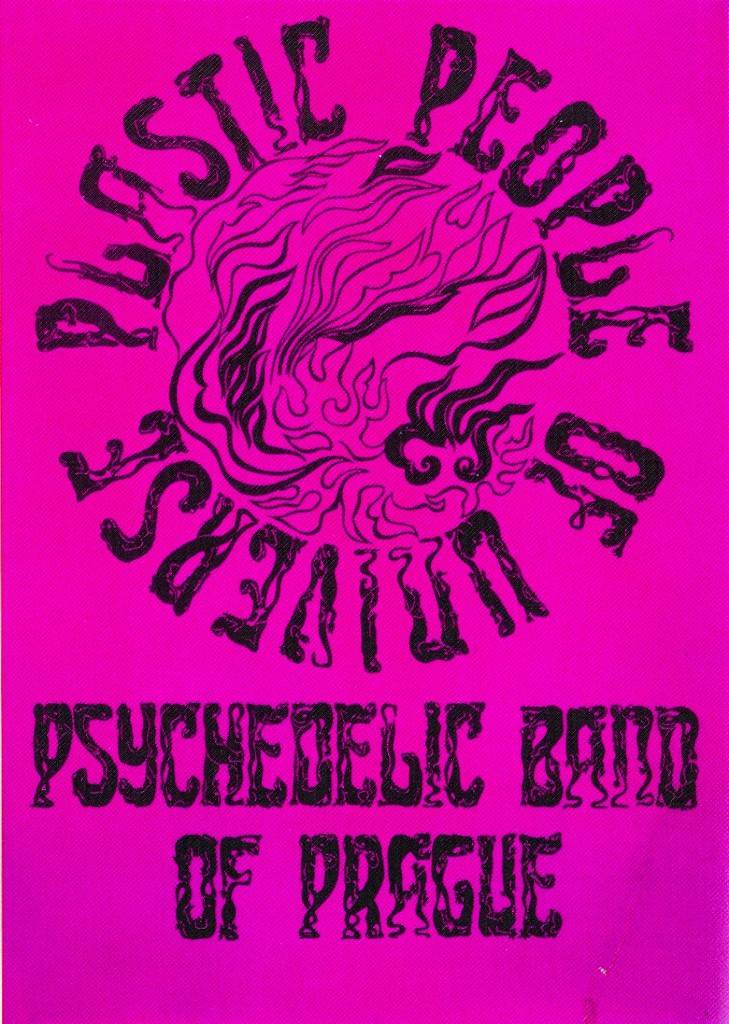
In 1969, when The Primitives Group had split up, Josef Janíček joined The Plastics and played the lead guitar, keyboards and sang. In that time, began to collaborate with The Plastics the team of artists lead by Ivan Martin Jirous. The band used sophisticated stage presentation – the musicians wore ancient Greek white togas with symbols of red suns and performed with make-up on their faces, fires were burning on the stage and coloured smoke shells were used. Inseparable parts of their stage decoration were models of red light-flashing flying saucers which were burnt out during the concert on July 21, 1969, the evening when American astronauts landed on the Moon. The Plastic’s repertoire consist of long dark instrumental compositions such as “Crematorium Smoke”, “Tropic of Cancer” (based on Henry Miller’s novel), “Gibson’s Sons” or “Gnor’s Life” (based on Alexander Grin novel) or “The Sun” (which contains philosophical statement of all Czech underground movement – “All the stupid brains are in the sun, our great nation lives in velvet underground”). Unfortunately, only few recordings had remained from this band’s era.
In 1970 became the process of political and social normalisation in Czechoslovakia, which was started by Communist party. The music and other culture were under strong rule of the Communists. The rock music was dying, art and culture of high quality was prohibited because of its ideational background. The rock musicians had to change the name of their band into Czech or Slovak, the lyrics of songs they sang had to be in Czech or Slovak language and their hair had to be short. Long hair was in that times sign of free life. The Plastic People of the Universe refused these conditions, so they have lost their professional statute. The personnel of the band had changed. Michal Jernek left the band. The new members were Canadian English language teacher Paul Robert Wilson, who sang, played the guitar, harmonica and percussion and violinist Jiří Kabeš, as well. The repertoire of this band period consisted of cover versions and new songs based on poems by William Blake, Edmond Spencer and Czech poet Jiří Kolář. This period lasted till 1972 when the Communist police interrupted their concert and their fans were beaten by the police.
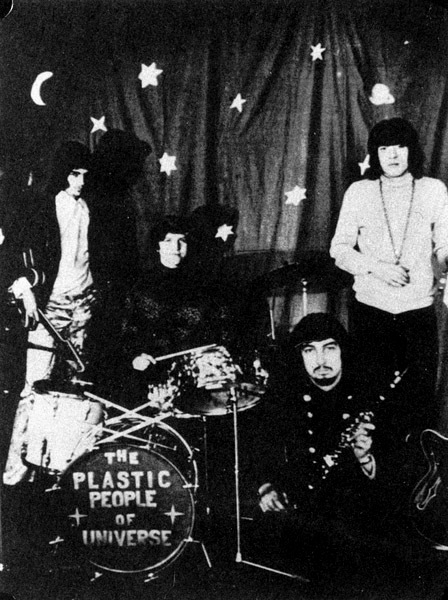
Ivan Martin Jirous was arrested for the first time for 48 hours. In 1973 the band changed their personnel again. Paul Wilson left the group and saxophonist Vratislav Brabenec joined the group. The Plastics began to music texts of Egon Bondy, the Prague poet and philosopher. The first songs based on Bondy’s poems were “Francovka”, “Dvacet” (Twenty) or “Magické noci” (Magical Nights).
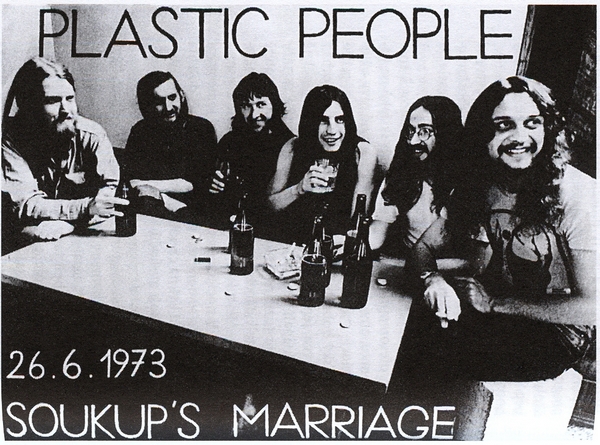
The stage presentation became to be simpler, with no visual effect or costumes. The problems with establishment kept on and in 1974 the Plastics were officially prohibited. Except the Plastics, there were some other bands in underground, existing as in brotherhood with Plastics – the groups as DG307, Umělá Hmota, Sen noci svatojánské band, song-writers Svatopluk Karásek and Charlie Soukup. In 1976 some members of these group were arrested. Ivan Martin Jirous, Pavel Zajíček of band DG307, Vratislav Brabenec of the Plastics and singer-song-writer Svatopluk Karásek were the first prisoners. They were arrested for 18 months. Ivan Martin Jirous was totally arrested for 8 years till 1989. These people were unrighteous criminalised for their free minds and obvious opinions against the Communist establishment. From 1976 the Plastics played only private concerts for invited friends.
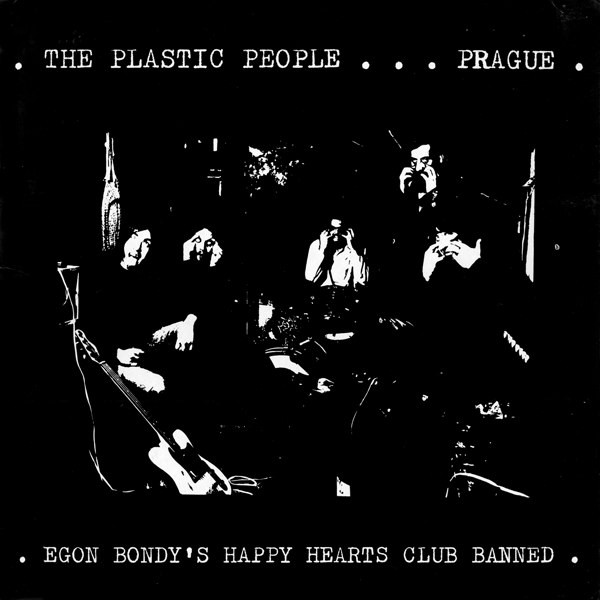
The repertoire of The Plastics until 1977 were absolutely based on Egon Bondy’s poems. In the end of 1970s The Plastics began to compose long conceptual works based on religious, biblical and philosophical themes of New Testament, or on works of paramystical Prague philosopher Ladislav Klíma.
In 1978 their first record was published in France and Canada, which consists of the recordings from 1975, the songs with lyrics by Egon Bondy, the album “Egon Bondy’s Happy Hearts Club Banned”. Their other records published in Canada, by Paul Wilson’s company Boží mlýn, were “Pašijové hry velikonoční” (Passion Play, 1978) and “Co znamená vésti koně” (Leading Horses, 1981).
DG 307
The band DG 307 was established in 1973 by Milan “Mejla” Hlavsa, bass guitarist of The Plastic People of the Universe and poet Pavel Zajíček. The band’s name is catalogue abbreviation of psychiatric diagnosis – situational stress disease. DG 307 was focused, from their beginnings, on experimental music with use of many “non-musical” instruments as radio, barrel-organ, siren, vacuum cleaner, etc. Musically, the band, was influenced by composers as John Cage, Edgar Varése or Prague conceptual group Aktual, led by Milan Knížák. The important part of their music were poems written and declaimed by Pavel Zajíček. The first personnel consisted of Pavel Zajíček – declamation, Milan “Mejla” Hlavsa – guitar, declamation, radio, vacuum cleaner and various instruments, Ivan Čeleda – bass guitar, Vladimír “Hendrix” Smetana – drums, percussion.
The genre of music, which DG 307 performed, was presented as “anti-music”, and was strongly different to production of the other underground bands, which was rather similar to music of The Velvet Underground, The Fugs, David Peel or Frank Zappa. The band’s performances were happenings with theatrical influences – the musician, in beginnings, performed clothed just like psychiatric patients.
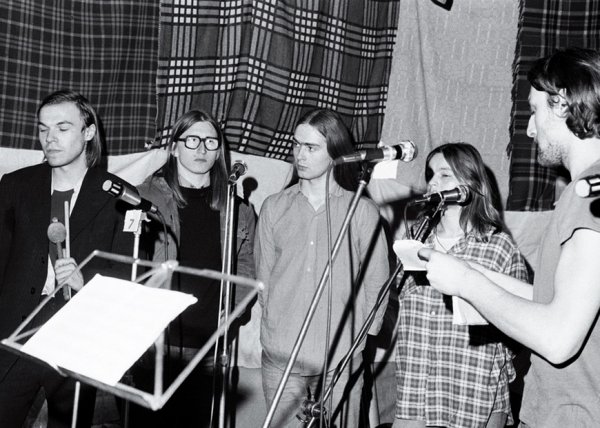
One of the greatest band’s performances happened in Kostelec u Křížku in 1973.
DG 307 played in advanced 10-musicians personnel. The instrumentation was very various – guitars, clarinet, violin, drums, various percussion’s, various DIY instruments, vacuum cleaner, barrel-organ, and many others. The last song of the concert was “Papírový a Psolutno” (The Paper Absolute) and the performance was ended by burning out the papers with DG 307’s lyrics.
In 1976 Pavel Zajíček was arrested, with Ivan Martin “Magor” Jirous (manager of The Plastic People), Vratislav Brabenec (saxophonist of The Plastic People) and Svatopluk Karásek (evangelical priest and song-writer) in communists-fabricated juridical process.
When Pavel Zajíček was back from the jail, he was working on new project – “Dar stínům”(The Gift for the Shadows) which was performed in Nová Víska on spring 1979. During the live performance of this work, the band played lightened by two spotlights behind white curtain and the auditorium has seen only shadows of playing musicians – according to the name of the work.
In autumn 1979 DG 307 prepared the next conceptual work – “Pták utrženej z řetězu” (The Bird Torn out of Chains), which was recorded in same personnel as “Dar stínům”. The live version of the work was recorded in underground community house at Nová Víska in the same way as “Dar stínům”. During the performance, musicians also played behind white curtain, but the curtain was cut on several places, so the auditorium has seen only some parts of the scene.
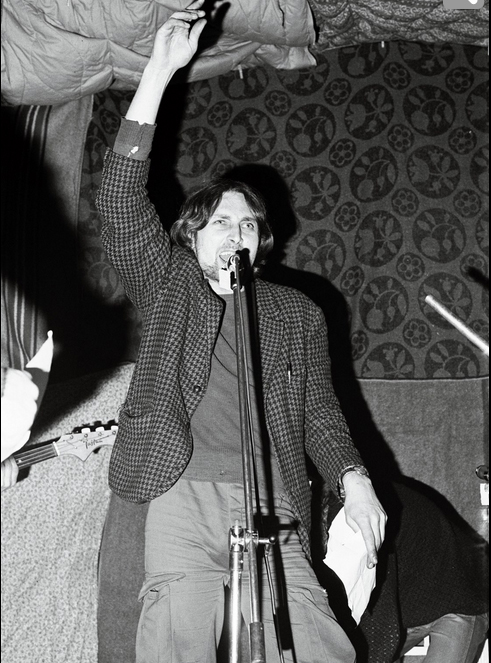
The last work of this triptych was “Torzo” from spring 1980. After finishing this work, Pavel Zajíček had been forced, by communist police, to emigrate from Czechoslovakia because of political reasons.
The next ten years Pavel Zajíček lived in Sweden and later in New York, USA. In 1989 in New York, with a help from his friends, Pavel Zajíček had organised concert for arrested Ivan Martin Jirous and František “Čuňas” Stárek (Prague underground journalist). Pavel Zajíček performed here with guitarist Gary Lucas. Allen Ginsberg and Ed Sanders of The Fugs had participated the concert, as well. From 1995 Pavel Zajíček came back to Prague and he still carry on in his musical, art and poetical work.
– Peter Markovski
1960s & 1970s Psychedelia in Czechoslovakia – Chronological Review

